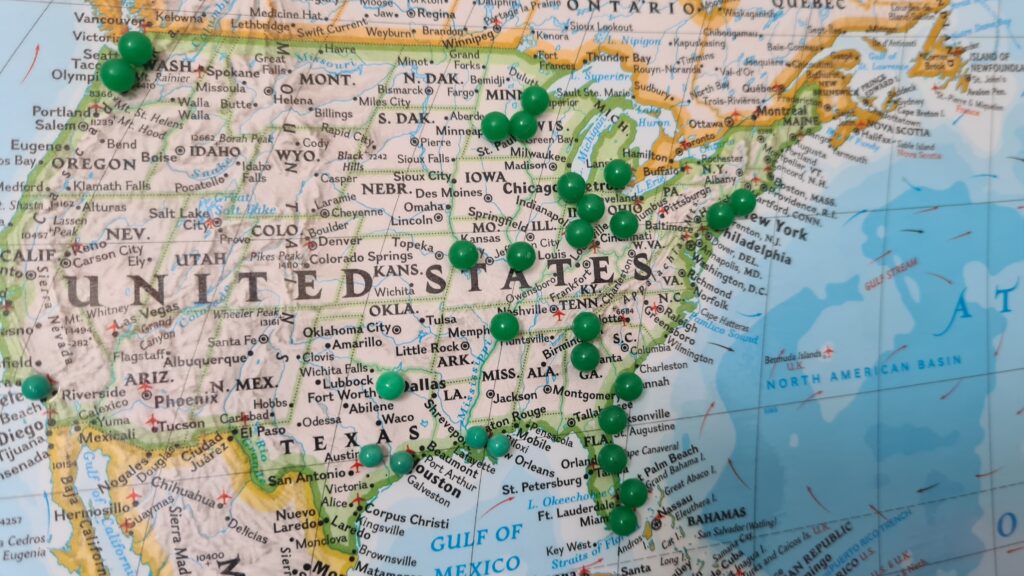When exporting products to the Americas, particularly the United States and Canada, several certifications and standards must be met to ensure product safety and compliance with regulations. Here are some key certifications required for exporting to North America:
- North American Safety Certification or NRTL CertificationNRTL stands for Nationally Recognized Testing Laboratory. The U.S. Occupational Safety and Health Administration (OSHA) mandates that all electrical equipment used in workplaces must either be certified by an NRTL or undergo a comprehensive on-site evaluation to ensure the safety of the products for end users.Materials and equipment falling into categories such as electrical conductors, portable fire extinguishers, fire detectors, flexible connectors for flammable liquids or liquefied petroleum gas, and lifting machinery, among others, must obtain approval from an NRTL.
- Canadian CSA CertificationCSA stands for the Canadian Standards Association, a nonprofit organization dedicated to developing industrial standards in Canada. Products such as electronics, electrical equipment, plumbing fixtures, and gas appliances intended for sale in the North American market need safety certification. CSA is one of the largest safety certification organizations in Canada and globally recognized for its safety standards.
- U.S. UL CertificationUL stands for Underwriters Laboratories Inc., a widely recognized and authoritative private organization in the United States that conducts safety testing and certification. While UL certification is not mandatory for all products in the U.S., it primarily focuses on assessing the safety performance of products and does not cover EMC (electromagnetic compatibility) characteristics. For consumers in the U.S., UL is a symbol of product safety.UL certification is applicable to a wide range of products, including wires and cables, insulation materials, plugs and sockets, electrical conduit fittings, labeling systems, assemblies, electronic components, power tools, industrial equipment, lighting fixtures, household appliances, medical devices, and more.
- North American ETL CertificationETL certification is equivalent to UL or CSA certification in terms of validity. Any electrical, mechanical, or electromechanical product with an ETL mark signifies that the product meets the minimum requirements of widely recognized U.S. and Canadian safety standards. The product is tested by Intertek, a Nationally Recognized Testing Laboratory (NRTL), to ensure compliance and consistency in quality.
- ENERGY STAR CertificationENERGY STAR is a U.S. government-led program aimed at energy conservation, primarily for consumer electronics. Products bearing the ENERGY STAR label meet energy efficiency guidelines set by the program.
- U.S. FCC CertificationThe Federal Communications Commission (FCC) is responsible for managing and controlling radio, communication, and EMC-related issues in the United States. FCC certification is mandatory for most electronic and electrical products that operate in frequency ranges from 9 kHz to 3000 GHz, including wireless communication equipment and systems. It addresses radio frequency interference, radio interference limits and measurement methods, and compliance with EMC requirements.
- Canadian IC CertificationIC, or Industry Canada, oversees EMC certification matters for electronic and electrical products entering the Canadian market. Products such as broadcast and television equipment, information technology equipment, radio equipment, telecommunications equipment, industrial, scientific, and medical devices are subject to IC certification.
- American ICC-ES CertificationICC-ES (International Code Council Evaluation Service) evaluates building products, components, construction methods, and materials. It is particularly relevant for construction and building materials, including fasteners, concrete anchors, manufactured wood, plastic lumber, doors/windows, wall cladding, roof materials, wall systems, flooring/deck systems, metal, and masonry, among others.
- North American NSF CertificationNSF International is a nonprofit organization dedicated to public health, safety, and environmental protection standards. NSF certification is relevant to various products, including food safety, water treatment, environmental health, and consumer products.
- North American ASME CertificationASME, the American Society of Mechanical Engineers, is responsible for the mandatory regulation and certification of boilers and pressure vessels exported to North America, particularly the United States and Canada. ASME certification ensures that products meet unified design and manufacturing standards for pressure equipment.
Meeting the necessary certifications is crucial when exporting to the Americas to ensure that your products are safe, compliant, and acceptable in these markets.

